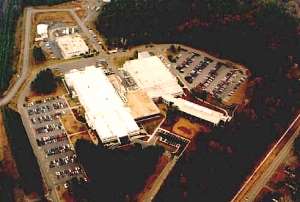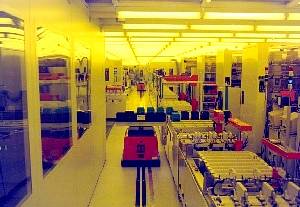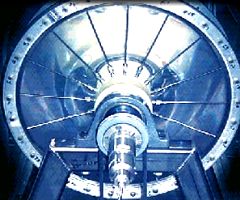|
 KBI BioPharma is moving its manufacturing operation into a 341,298-sq.-ft. (30,717-sq.-m.) building (pictured) on a 75-acre (30-hectare) campus in north Durham. |
|
KBI BioPharma's 550-Worker Plant Headed for Durham, N.C.
by JACK LYNE, Site Selection Executive Editor
of Interactive Publishing
"Just what is biotech, anyway?"
- Farmer from east Carolina
"About $17 an hour."
- Gov. Mike Easley
– Exchange during North Carolina's Biotech 2003 Conference in Research Triangle Park, N.C.
DURHAM, N.C. – KBI BioPharma (www.kbi-usa.com) has honed in on Durham, N.C. (www.durhamchamber.org) as the home of its new biomanufacturing plant, which could employ as many as 550 workers by 2008.
A promising Atlanta-based biotech startup, KBI BioPharma has signed a contract to buy a 341,298-sq.-ft. (30,717-sq.-m.) building on a 75-acre (30-hectare) campus in north Durham.
That facility served for 15 years as a Mitsubishi Semiconductor America plant. Mitsubishi Semiconductor, however, shut down the wafer-fabrication operation in 1998, part of a corporate restructuring to refocus the firm on chip design and engineering. The structure has stood vacant since.
The empty building, though, could fill KBI's ambitious needs. A 12-month-old spin-off of Atlanta-based Kinetic Biosystems, the company is a bio-pharmaceutical and biotech contract manufacturer, using living human cells to create medical products that include antibodies, amino acids and proteins. And the onetime Mitsubishi complex has a host of features that also meet biomanufacturing requirements, including specialized water- and air-filtering systems.
 Mitsubishi Semiconductor former chip plant contains 52,179 sq. ft. (4.696 sq. m.) of clean-room space (pictured). |
|
Purchased from Mitsubishi in May of 2001 for $18 million by Durham-based Teer Associates (www.teer-rtp.com) and Stamford, Conn.-based Icon International (www.icon-intl.com), the former chip plant contains 52,179 sq. ft. (4.696 sq. m.) of clean-room space and 5,023 sq. ft. (452 sq. m.) of laboratory space. The complex also includes 139,036 sq. ft. (12,513 sq. m.) of office space, as well as a cafeteria and storage space.
Complex's In-Place Infrastructure Could
Reduce Capital Investment by 40 Percent
That large swath of square footage promises big savings in money and time for KBI.
Renamed Teer Technical Park, the former Mitsubishi plant "is beneficial to our startup plans," President and CEO R. Anthony Laughrey noted after KBI signed its offer. "The savings it will provide in investment are important."
KBI's capital investment for its first-phase expansion will total about $45 million, according to officials with the Greater Durham Chamber of Commerce. Thanks to Teer Technical Park's existing infrastructure, that's about 40 percent below the company's initial expectations for phase-one investment, Laughrey said. And the complex's ready convertibility "could save us half the time," he added.
Even with those savings, though, the company has a very long way to go to fill Teer Technical Park. At the operation's peak, Mitsubishi Semiconductor had a staff of almost 600 workers in the complex.
KBI, on the other hand, currently has 12 employees. The young firm has been based in incubator space at Georgia's Advanced Technology Development Center, which also houses parent firm Kinetic Biosystems.
But the expansion numbers to fill Teer Technical are there - at least on paper. KBI's business plan calls for hiring 75 manufacturing workers in its first two years, increasing total employment to 550 by 2008, Laughrey explained.
Those positions' pay will make them very attractive openings. KBI's average manufacturing wages will be more than $60,000 a year, said Laughrey. Those jobs can be filled by workers with either high school or college degrees who have university or community college certification in biomanufacturing processes.
NC Bio Center Providing $1-Million Loan
Tar Heel State business recruiters certainly saw ample promise in KBI's business plan. The company in April received a $1 million startup loan from the North Carolina Biotechnology Center (NCBS at www.ncbiotech.org), a private, non-profit arm established by the state legislature in 1981 to develop the biotech industry.
 "We concluded that KBI was a company with high growth potential that would further strengthen North Carolina's biomanufacturing industry," North Carolina Biotechnology Center President and CEO Leslie Alexandre (pictured) said in announcing the $1-million loan to the company. |
|
"After a thorough due-diligence process, we concluded that KBI was a company with high growth potential that would further strengthen North Carolina's biomanufacturing industry," NCBS President and CEO Leslie Alexandre said in announcing the loan. "We believe that over time hundreds of high-paying jobs will be created, not only at KBI but at the many companies that will support KBI with products and services."
North Carolina was one of seven states that KBI considered, explained Laughrey (who didn't disclose the other contenders).
"We are choosing North Carolina over six other states," he said, "because of its supporting infrastructure for the biosciences, including the Biotechnology Center, excellent research universities and community colleges, specialized construction and engineering companies, available workers, extensive work-force training programs, [and] high quality of life. None of the other six measured up when all of these factors were considered. The North Carolina Biotechnology Center and the North Carolina Department of Commerce [www.nccommerce.com] recruited us and provided a comprehensive view of the many opportunities throughout the state."
The NCBS loan committed KBI to North Carolina. But the company hadn't selected a specific site until it signed the Teer Technical contract. KBI looked at locations in 15 North Carolina counties before settling on Durham, Laughrey said. The company will keep its research arm based in Atlanta, he added.
 KBI's contract manufacturing process will use living human cells inside bioreactors (pictured) to create medical products including antibodies, amino acids and proteins. Photo: KBI BioPharma |
|
E&Y Report: NC No. 3 Biotech State
North Carolina's existing biomanufacturing sector was a major factor in KBI's choosing the state. The Tar Heel State finished as the No. 3 U.S. biotech state in a recent Ernst & Young survey, Beyond Borders: The Global Biotechnology Report 2003.
The state has a number of significant biomanufacturing plants. Those operations include Ajinomoto USA in Raleigh, Bayer in Clayton, Biogen and Diosynth in Research Triangle Park, Corn Products International in Winston Salem, and MWG in High Point.
Even more importantly for KBI, many of North Carolina's biotech players are small operations that must focus capital on research, not on building plants. KBI's business plan has identified 155 North Carolina small biotech firms that it feels are prime prospects for outsourced manufacturing.
KBI executives have already begun approaching some of those companies about contract manufacturing.
Further State Incentives in Offing?
It still remains to be seen what, if any, additional incentives KBI will receive from North Carolina. The company hasn't asked for or been promised other subsidies, according to the Greater Durham Chamber of Commerce.
But Greensboro, N.C.-based real estate developer Frank Auman, a lead investor in KBI, has said that the company could qualify for more than $1.6 million in tax incentives under the William S. Lee Quality Jobs and Business Expansion Act. The Lee program provides tax credits for new jobs, worker training, R&D, and machinery and equipment investments.
In addition, North Carolina's Golden Leaf Foundation in August launched a new $64.5-million biotech manufacturing training initiative. The state legislature established the Golden Leaf Foundation in 1999 to use North Carolina's $2.3-billion share of the national tobacco settlement to create jobs in low-income areas. Most state residents live within 30 miles (48 kilometers) of a biomanufacturing or pharmaceutical manufacturing facility, according to North Carolina officials' estimates. And it may prove significant that KBI's business plan calls for 65 percent of its hires to come from rural North Carolina counties.

Incentives could end up being integral in making KBI's business plan happen. The company has raised $6 million in venture capital, said Laughrey, and has entered into a collaborative agreement with a thus-far unnamed large pharmaceutical firm. KBI is seeking to raise another $15 million to $20 million in debt financing for working capital for operations.
The Durham plant will start operations, and start producing revenue, in six to nine months, Laughrey said.
Editor's note: For more on North Carolina and biotech, watch for Site Selection's upcoming 50th anniversary issue in January 2004. And for more on the industry's site selection schemes, see "Biotech Location Strategies" in the September 2003 Site Selection.
bd0901bbd0901b
©2003 Conway Data, Inc. All rights reserved. Data is from many sources and is not warranted to be accurate or current.
|




